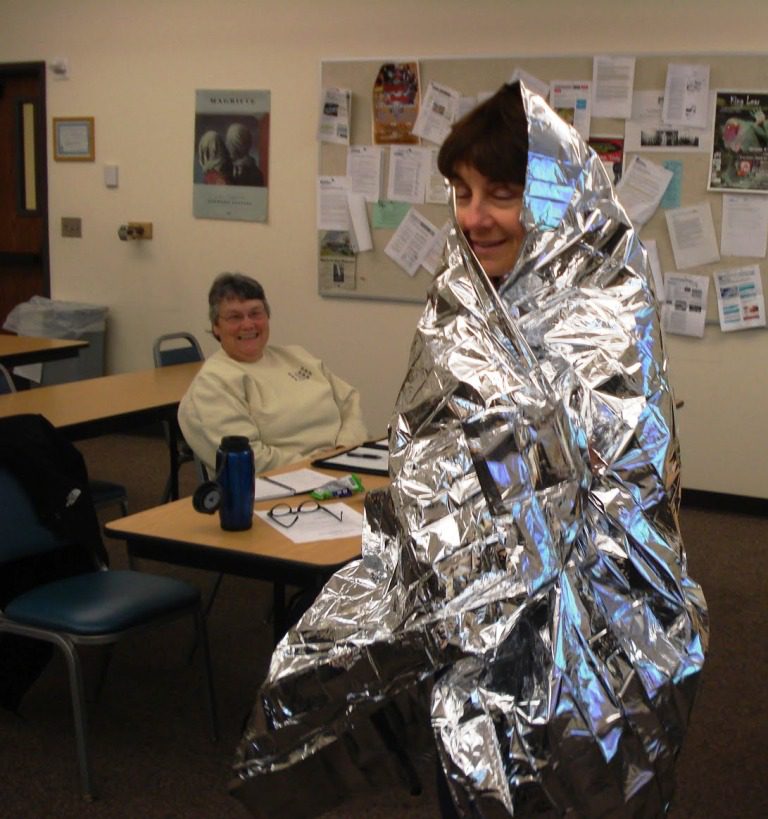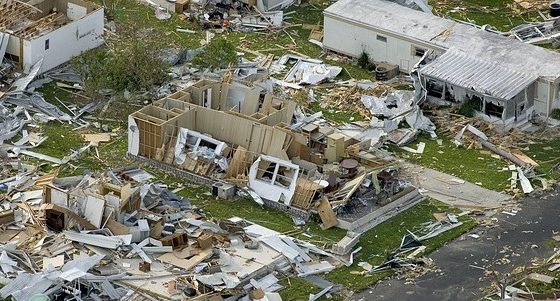Chapter 9: Prescott, Wisconsin
It only took a little modification to make the Grumman Rowing Rig fit Dunderhead. The rig was really a seat with fittings for oarlocks. It was placed next to the center brace, on the stern side. Two holes were drilled into the gunnels and bolts attached the setup permanently to the canoe. I bought oarlocks at the local K-Mart, and when I attached the 10-foot oars, Dunderhead looked like some sort of hybrid rowboat/canoe.
The four frosting buckets were placed side-by-side in front of the rowing seat. Other gear was packed in around them. My cooler was placed at my feet, so I could brace my legs against it for more leverage when rowing.
After a few days, I could load and unload the canoe in a matter of minutes. Everything had its place, and Dunderhead was a well-balanced, efficient long-distance traveling vehicle. My fishing rod was strategically placed, so I could get a lure in the water at a promising fishing spot in a matter of seconds.
But I quickly learned the standard rowing rig was apparently not intended for long distance travel. By the end of the first day of rowing, the oarlocks shrieked and howled at every stroke. The noise was hideous. Since I had nothing else, I dabbed solid Crisco on all the moving parts, and the noise quieted as if by magic. A commercial lubricant was later tried, but it made more of a mess and didn’t work as well.
Crisco became my all- purpose oarlock lube and cooking oil. Nothing fried fish crisper without burning, and it solidified when cool, eliminating the danger of spilling in the dry box. An application on the oarlocks lasted about 50 miles, depending on how hot the day was.
Under the best of circumstances, a set of oarlocks lasted about 500 miles. I wore out three sets on the journey, but they were easily replaced in any town with a K Mart.
###
Prescott, Wisconsin. – The beauty of the morning seemed to be an apology for the storm the night before. The sun rose on a clear, blue sky and the cool air felt light and fresh. The gentle breeze carried a clean “just-rained” odor and brought the smell of wet leaves and flowers up to the bank. The river ran high and muddy, with leaves, green branches and one tree that had been uprooted somewhere upstream.
Yesterday’s journal entry brought a smile. Standing in the shade, and leafing through the pages to look for water damage, I noted the entry for July 15 would have to be re-written. All I’d mentioned was: “…..a routine, HOT day from Hastings, Minn. to -”
Prescott received its official name in 1851, apparently in honor of Philander Prescott, a fur trapper who built a cabin on the site where the City of Prescott now stands. The town is located at the confluence of the Mississippi and the St. Croix Rivers. The rivers played an important factor in the beginnings of Prescott, since river traffic had to go by way of the Mississippi or St. Croix Rivers.
This made Prescott a center for river shipping, transportation and milling. Immigrants arrived via steamboats and settled in Minnesota and Wisconsin. The first order of business for many of them was to buy some timberland to homestead. The huge white pines further north were harvested for a cash crop and rafted down the St. Croix by logging crews.
In 1896, over 209 million board feet of lumber were rafted to Prescott. Several warehouses stored food and supplies, and hotels accommodated the influx of people, resulting in the development of restaurants, banks and many new homes.
I’d spend the afternoon wandering around Prescott, and decided to leave in the late afternoon. The weather was hot and muggy. It felt like a storm was brewing.
“There’s a thunderstorm warning out, and bad weather is on the way!” a boater at the Prescott Marina warned. He was trying to tie up his powerboat so it could weather a good blow.
“You better find a place to hole up!”
I looked around and wondered where that might be. There was no shelter on the dock, and I wasn’t near anything resembling a storm shelter.
But the weather was making me edgy. The sky had a threatening bluish-purple tint, and in Iowa, that meant a big thunderstorm or tornado was on the way, and the farmers would be preparing to leave the fields.
I remembered the Jordon tornado that devastated our neighbors’ homes and farms a few years before, and how it all started with that same color sky. My Dad had been driving a tractor and cultivator in the corn field east of the house, when he noticed the sky changing color. He decided to take one more round, and several minutes later, when Dad turned around at the end of the row, he saw the twister. He shut off the tractor and ran to the house to warn everyone to get in the basement.
“I knew he was scared,” Mike told me later. “That’s the only time in my life I ever saw Dad run!”
Another tornado demolished several nearby neighbors’ houses and barns. Dad was standing in yard, watching the progress of the funnel cloud, and wondering which direction it was going to go.
The wind started blowing the hot, heavy air around with a sudden chilling effect.
Leaving the marina only took me further away from any buildings. Where was I going to find a shelter? Maybe there was a culvert under a road, or a bridge.
Those were good choices if you got caught out away from a shelter. People in a car knew to find a crossroads, park with the engine running and watch the tornado. If the cloud headed in the direction of the crossroad, you drove at a 90 degree angle to the tornado route.
So while I knew what to look for, I wasn’t seeing any sort of refuge.
The only possible port for the impending storm was a sandbar island in a bend of the channel. From the windswept look of the island, all the loose branches had blown off. Most of the willows grew out of sheer tenacity, since frequent flooding and winds had cleared out most of the bigger trees.
Dunderhead was pulled up on the bank and all the gear was stowed up underneath it. Behind a clump of limber-looking trees, I set up the tent and tried not to notice the evening was much darker than it should be. And then the wind died down to nothing. The stillness amplified a roaring from the north that sounded like ocean surf.
“Oh, no ……” I thought, and watched the bank of clouds come toward me. The first blast sent the treetops to the sand, and me running toward the tent.
The sand blew sideways in sheets, like it was a Sahara storm, while I sat inside and tried to hold up the sides of the tent. The dome tent was not designed for wind, and the sides kept trying to wrap themselves around me.
The wind lessened some, and the rain started. The rain fly was ripped off and headed for Missouri, and the next gust blew the tent over. While I wallowed in the sandy folds, I remembered what a beer truck driver at a marina had told me. His name tag said “River Rat.”
“Always tie one corner of your tent to a tree. If your tent has a bottom, and blows over, you’re stuck in a bag,” he’d warned. “If you get to rolling and end up in the river, you’ll drown because you won’t be able to swim.”
I hadn’t thought to do that, so when the stakes pulled out in the wind, the tent became one big bag. The wind made the bag conform to the movements of my hands and feet, and it felt like I was trapped in a big plastic bag and about to smother.
The mosquito netting had been left open in case I had to leave quickly, but finding the door was something else. I was ready to start hacking with my Buck knife when I found the flap and wrestled the tent off me.
It was more terrifying outside than it was in the tent. The willows were bent to the ground, and the sand blew horizontally. Rain beat down like hail, while the river raged and foamed like some sort of beast. The low black clouds and eerie howling of the wind made the scene like something out of a horror movie.
I never did manage to stand completely up. Before I got my knees much off the sand, another blast blew me off my feet. Looking around wildly for someplace to go, I saw the dim, sandy outline of the canoe. I crawled on my hands and knees toward the only shelter on the island.
Stark fear made the distance see endless. Small branches flew all around, making sickening thuds when they landed. My face felt like it was being sandblasted, and the howling of the wind set my teeth on edge. If there would have been any place to go, I would have run like a scared rabbit in front of the wind.
There was no room under the canoe. I grabbed the first bucket handle I could find and threw the container out on the bank . A large tree crashed to the ground nearby, the noise momentarily overcoming the wind. I crawled under the canoe and prayed that would be enough shelter.
The wind’s howling increased, then turned into a sound that made my hair feel like it was standing on end. The old-timers in Iowa talked about how tornadoes sound like locomotives. From the sound of this train, I was about to get run over.
Unbidden, the words I’d learned years before in Catechism class came to my lips. In a moment of clarity, I could even remember the name of the nun who had insisted we memorize the 23rd. Psalm. My rendition under the canoe was definitely heartfelt and would have gotten me a gold star from the toughest Mother Superior! By then, I’d run through almost every prayer I’d ever learned, and even in my terror was amazed at my recall.
By the time the locomotive sound was over the canoe, I was past the point of even calling for help. All I could do was bury my face in the sand, cover my head with my arms and shake.
Meanwhile, the wind was pushing the river water up under the canoe in larger and larger waves. Moments after the locomotive passed, a tidal wave seemed to wash up under the canoe. I held my breath, grabbed the side, dug in my toes, and with unusual strength kept it from heading downstream. It fell crookedly on the gear, and a second wave never came.
The wind made a tremendous crash when it hit the larger trees on the other bank, and moved downstream to rage somewhere else. After a final display of natural fury, the sky settled down to some serious raining that decreased to a drizzle after a few minutes.
I was still shaking when I crawled out from under the canoe. The sandbar was covered with loose branches, and why one didn’t hit me can only be attributed to the grace of God. I felt like a wet dishrag, drained of all strength and emotion, and couldn’t believe I wasn’t hurt.
The rain stopped and the mosquitoes returned for their nightly strafing attacks. Luckily, one of the tent stakes had held, and the rest of the tent was buried in a small dune, Without bothering to shake out the sand, I propped up the tent, got inside and crawled into my bag, as tired as if I’d rowed 40 miles that day.
The next morning’s assessment of the situation showed I was up the creek without a bucket. The one I’d tossed out on the bank was gone, taking my wallet, money, shoes, extra clothing and journal. My glasses had disappeared, and now I was going to have to figure out some way to get replacements.
Funny thing though. After swimming and rinsing out my clothes, I felt almost euphoric. I’d lost some important things, but they could be replaced. I was alive, unscathed and the air had never smelled fresher, the sun was never so welcome and breakfast never tasted better.
I whistled while I loaded the canoe and slid it into the river, much happier than a man with no shoes, ID, money or glasses has a right to be. I rowed steadily, assessing the storm damage evident on the banks.
The Minneapolis Tribune reported winds of 89 mph with gusts to 110 mph for the night of July 15. Storm damage was evident from the river. The twister had cleared a path through several places in the underbrush and broken limbs and branches dotted the surface of the water.
In 24 hours, I’d seen both sides of the Old Man. From the sunny, friendly giant I was used to, it had turned into a dark, raging beast, and I was still in awe of the forces I’d seen the night before.
But after that night on the sandbar, I started to enjoy the storms on the river. This was yet another reason I would get marked as an eccentric at most public campgrounds. People in RVs would see me walking around in my yellow rain suit and offer me shelter.
“You’re crazy to be out there!” they’d say while huddled around their portable TV sets, listening to weather reports. I felt a little condescending – after you’ve ridden out a tornado under a canoe, a little rain doesn’t amount to much!
My singing and reverie on the morning of July 16,was interrupted when I sighted a white object on a snag. Hoping it wasn’t a Clorox bottle marking a trotline, I pulled over to see. My joyous whoop echoed off the bank as I grabbed the wire handle and pulled. Incredibably, is was my missing bucket, and the weight felt normal, like there wasn’t any additional water inside.
The lid seal had held, and everything was dry. I pawed through the contents, and leafed through the journal, looking for dampness. Yeah, I would re-write that previous entry!
It felt like Thanksgiving, Christmas, the Fourth of July and my birthday, all wrapped up in one. I had all my gear back, and I had one story, at least, that wouldn’t ever need any embellishing!
I looked at the date on the journal again, and a bell rang in my mind.
It was my birthday! I’d been too busy to notice, but I was now 28 years old!
“Thank you!” I hollered at the sky. “You got me just what I wanted! And next time we talk, it won’t be just because I’m in a jam!”




Leave a Reply